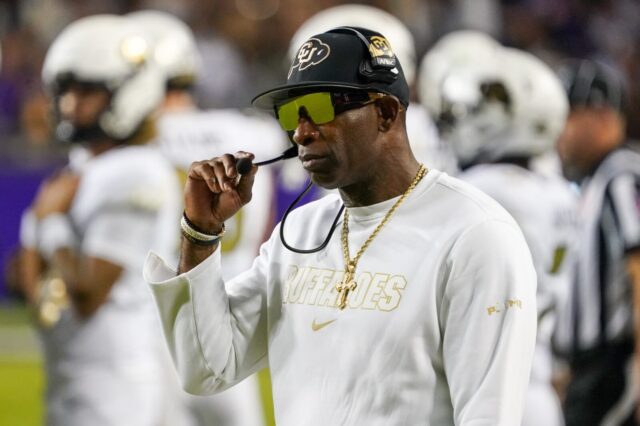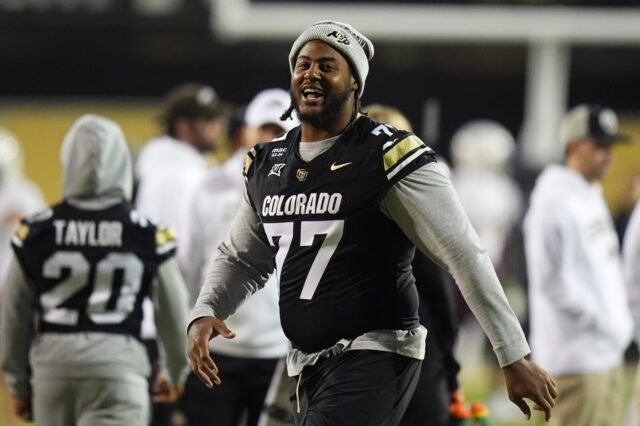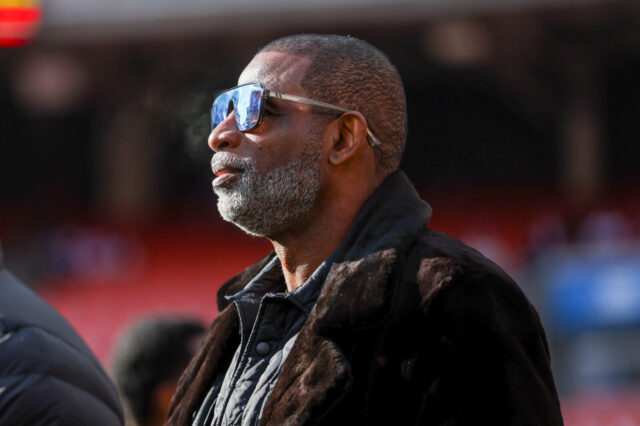Editor’s Note: This column originally appeared in the fall edition of The Stampede, the official publication of the Buff Club. It was published before the Colorado football season began, but with the Buffs sitting at 3-1 behind a rejuvenated defense, it was clearly onto something.
It’s easy to put the words “well traveled” in front of Coach Jim Leavitt’s name and push him into the category of so many dozens of college football coaches who’ve made stops all across the country. It’s true that (like many others) his coaching résumé has a lot of names on it: Morningside, Iowa, Kansas State, South Florida, and even the San Francisco 49ers. What’s different about Jim Leavitt is a level of commitment that’s rare in the profession.
Most men, as they rise up the coaching ranks, would never think of saying “no thanks” to head coaching opportunities at places like the University of Alabama… or Kansas State… or the University of Miami. But while he was head man at South Florida, overseeing a program he literally built from scratch, Leavitt did just that, turning down those opportunities to leave the Tampa-based University for far greener pastures. Leavitt wanted to stay with the program he’d helped launch in 1996 and had playing in a bowl game a decade later. In all three of the above cases, Leavitt removed himself from consideration for positions he had a very good chance to land.
In fact, the Harlingen, Tex. native coached the Bulls for their first 13 seasons, initially as a brand-spanking-new Division I-AA (FCS) program, then as the school jumped up to join Conference USA in 2003 and finally into the Big East in 2005. During the wild and wacky season of 2007, Leavitt’s squad ascended to No. 2 in the national polls (one of a record-setting seven teams that held the number two ranking only to lose during that season) before losing the following weekend at Rutgers. He compiled a record of 95-57 over those 13 seasons – truly remarkable for a startup program.
Leavitt finally left USF following a dispute with the administration after the 2009 season, moving on to his first NFL job. He was hired by 49ers coach Jim Harbaugh to coach the linebackers and was a member of the staff that took the team to the Super Bowl at the end of the 2012 season.
When Harbaugh left the bay area for Michigan after last season, Leavitt and the other assistants were let go. It didn’t take CU Coach Mike MacIntyre long to snag him. The 58-year-old Leavitt was introduced as the Buffs’ new defensive coordinator in early February, just days before the start of spring football.
“He has great expertise, number one,” MacIntyre said of his new defensive coordinator at Pac-12 Media Day. “Number two, he has great passion and energy. And number three, he’s a grinder. He works at it hard. So he’s been with our defensive staff, meeting a lot with me, and then he’s had (meetings with players) – we were able to meet two hours a week with the kids and he’s been able to do that. I think his overall energy and expertise and effort, the combination of the whole has been exciting for us.”
“I just felt like this is where I’m supposed to be,” Leavitt told CUBuffs.com after his arrival in Boulder in February. “Because that’s my life. I’m just being honest. I just felt this is where I was supposed to be. I spent a lot of time in prayer about it, thinking about it. Late nights thinking about a lot of different things.”
MacIntyre is counting on Leavitt to help turn around a Buffs defense that ranked near the bottom in most NCAA statistical categories last season. Moderate improvement in those statistical rankings could certainly lead to more victories this season. While he made a name for himself as a head coach, Leavitt has ample experience as a defensive coordinator as well, spending time on the staff of Bill Snyder during the ascension of the Wildcats program in the early 1990s.
“Jim was at Kansas State, and they helped turn that program around,” MacIntyre noted. “He started the program at South Florida from scratch. So both of those he’s been kind of where we are right now. So when we talk about different things, he can give examples. So I listen intently to it. I like all of our staff. I don’t want ‘yes’ men on our staff. I want guys that bring things up over and over and over – and they do –
then I have to decipher where we go from there.”
Leavitt’s expertise at both the college and professional levels should help improve things for the Buffs defense, although the veteran coach, who arrived in Boulder just days before the start of spring practice, has tempered his expectations for the coming season.
“The thing about these guys is that they want to be good,” Leavitt told the team website at the end of spring practice. “It’s hard for them because they’ve been in different systems. I couldn’t tell you what we’re going to run yet, I’ve got an idea of where I want to go, but I don’t know if I can get to that. It might be a little while before we get there. We have to wait and see… it might start in one direction and curve a little bit.”
The early response from his players was very positive on everything from the new schemes to the new approach.
“From talking in the locker room away from the coaches, we all just really took pride in his energy,” cornerback Ahkello Witherspoon told CUBuffs.com. “When you have someone who has such energy, you want to put your all in for that person and do your best, really listen and fit into his schemes as best you can. You get to practice every morning and he’s meeting you at the gate – ‘We’re moving, we’re moving!’ You can’t deny that energy. It’s awesome.”
“He comes out with a lot of energy,” grinned junior linebacker Kenneth Olugbode during Pac-12 Media Day. “Every day he’s out there running with us. Right when you step on the field, there’s no walking anymore. You run everywhere you go. He’s always saying ‘We’re moving, we’re moving.’
“Last year, we saw what we were capable of at certain points. We know we can play with anybody in the Pac-12, so we’re not too worried about what anyone else thinks,” Olugbode continued. “We know what we can do. Finishing is our thing. There are times we’d go down early in the game and come back, but we needed one big play or we needed to stop somebody here or there and we just couldn’t do it. If we change that around, those close games will become Ws. It’s a mental thing, and everyone just doing their job when it comes down to it.”
MacIntyre agrees, telling the website after spring ball, “We kept improving. I thought our defensive line got better; we got good depth in the secondary. I’m excited about what we showed this spring. Got to get out there and do it in the fall.”
MacIntyre knows he will be able to lean on the former head coach when things get dicey.
“He’s not going to leave any stone unturned. He’s going to make sure, if, for example, I learn a certain way and you learn a certain way and we’re not getting it, he’s going to find a way to make sure we’re going to figure it out. He’s not just going to say well, he doesn’t get it. Also, as a staff they’re going (through) everything (with a) fine-tooth comb, really great attention to detail. You can’t do enough of that.”
The pundits seem to agree that the Buffs will be an improved defense – and an improved team – in 2015, although the 13-game schedule doesn’t feature many breaks. MacIntyre and his staff, including Leavitt, understand that for the anticipated improvement to translate to more victories, the Buffs need to improve in every category and get a lot better at the little things.
“We’ve gotten together and worked on it,” continued MacIntyre. “Jim has a great expertise. Then bringing in (new defensive backs coach) Joe Tumpkin, who was a defensive coordinator at Central Michigan… we have two defensive coordinator-type guys. It’s going to be good.
“Studying our league and looking at our league and how our league plays,” added the head coach, “it’s a little different. I’m excited about what we’re doing and how we’re going to do it. We can’t do the exact same thing we were doing, so we’ve changed it up. But you can’t do too much, either, because if you do too much, the kids are just standing there and not running to the football and reacting. So we’ve adapted the playbook more to be able to stop a lot of the Pac-12 offenses.”
MacIntyre has proven he’s not afraid to shake things up, to try different approaches in the never-ending quest to improve. Bringing in a new coordinator like Leavitt is a bold move for a third-year head coach and one that Buffs fans everywhere hope will yield big dividends.



